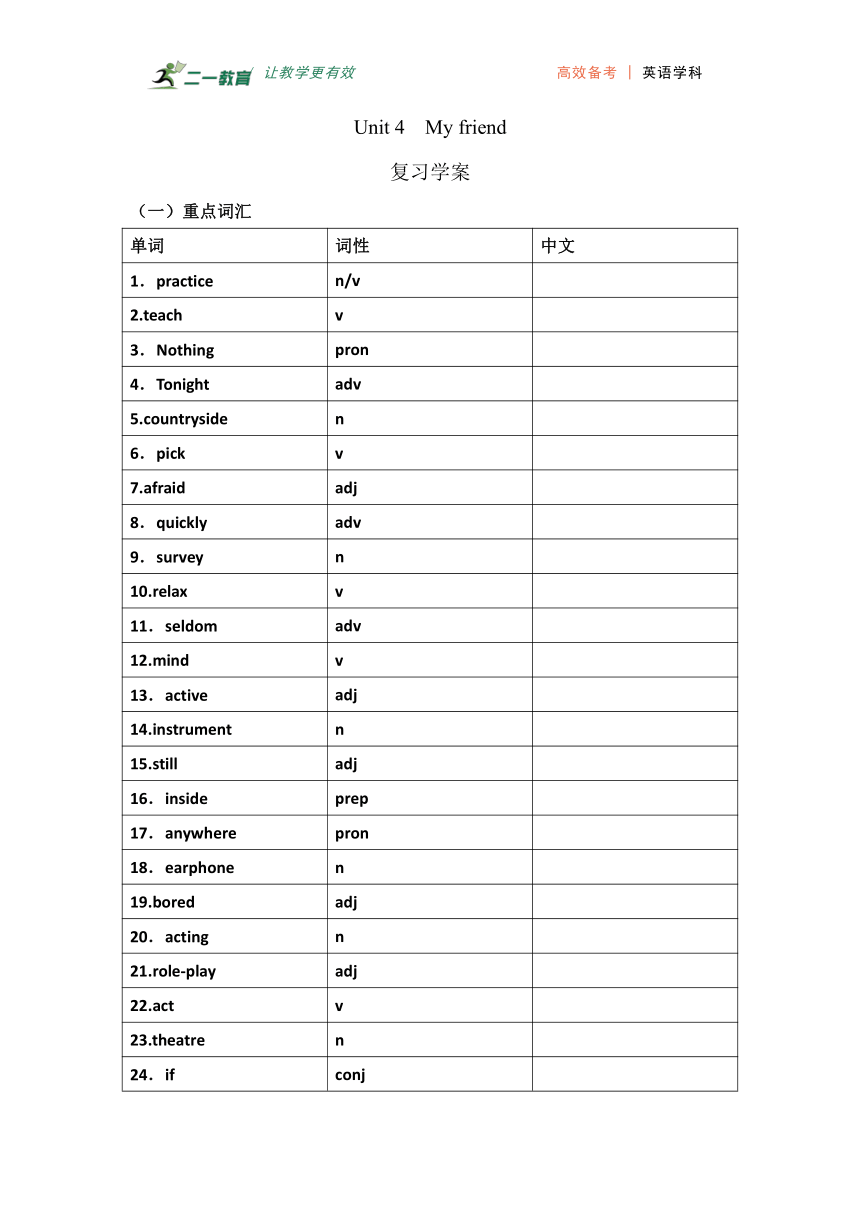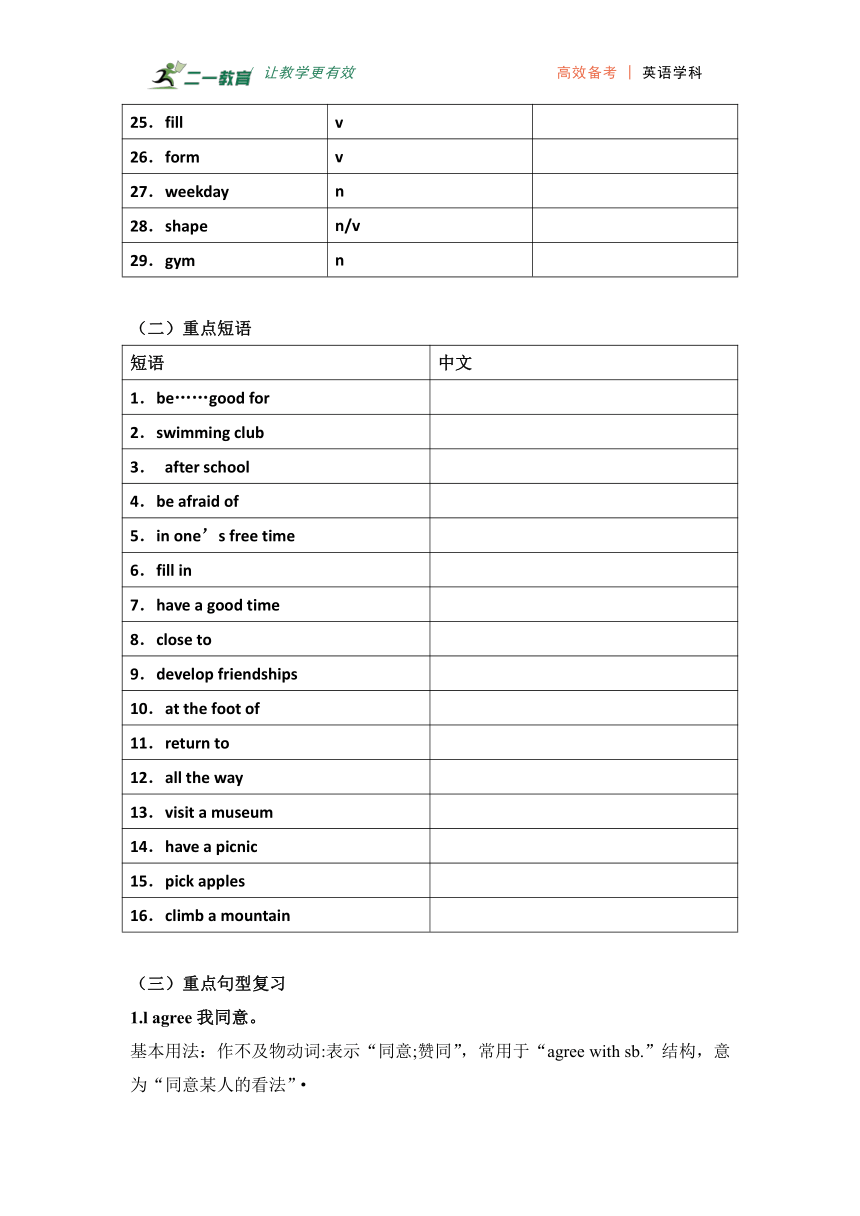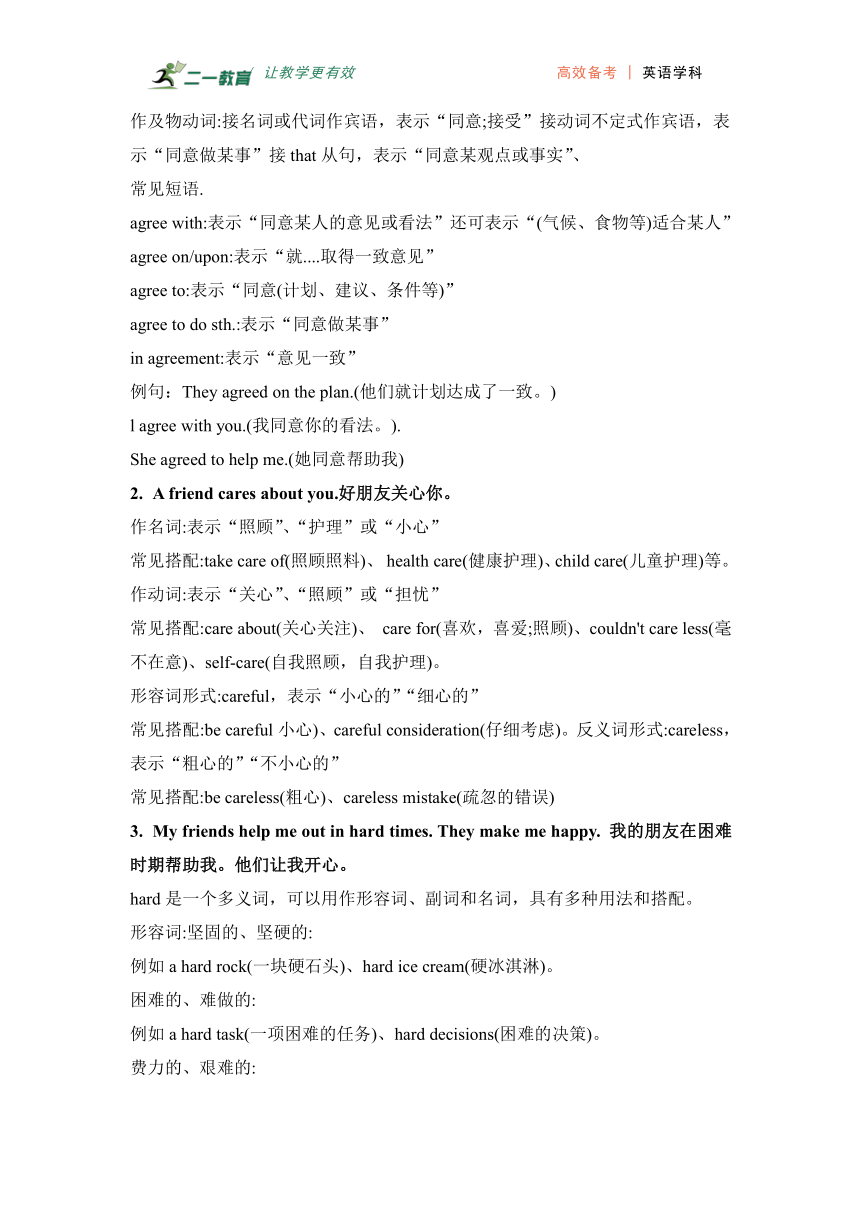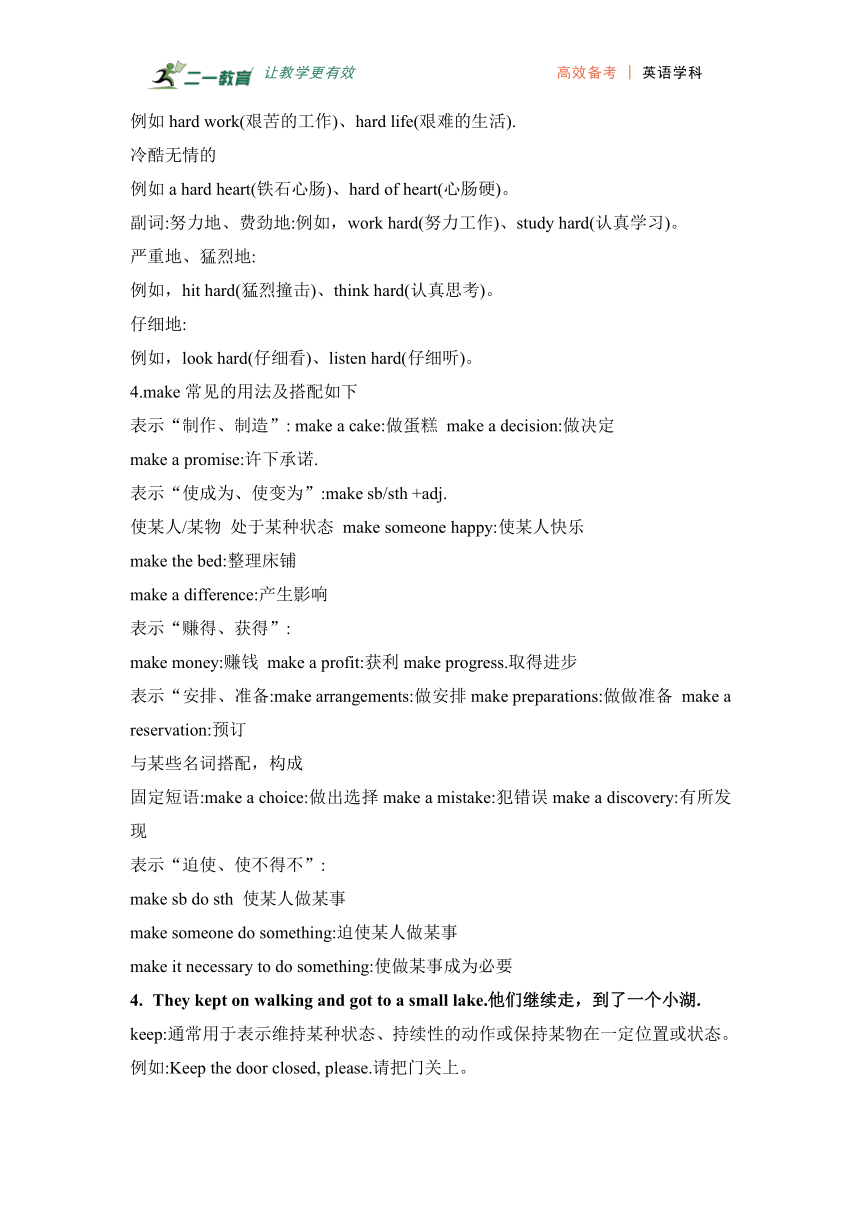Unit 4 My friends单元复习学案(含答案)七年级英语下册(冀教版2024)
文档属性
| 名称 | Unit 4 My friends单元复习学案(含答案)七年级英语下册(冀教版2024) |  | |
| 格式 | docx | ||
| 文件大小 | 49.3KB | ||
| 资源类型 | 试卷 | ||
| 版本资源 | 冀教版 | ||
| 科目 | 英语 | ||
| 更新时间 | 2025-03-24 11:40:51 | ||
图片预览





文档简介
/ 让教学更有效 高效备考 | 英语学科
Unit 4 My friend
复习学案
重点词汇
单词 词性 中文
1.practice n/v
2.teach v
3.Nothing pron
4.Tonight adv
5.countryside n
6.pick v
7.afraid adj
8.quickly adv
9.survey n
10.relax v
11.seldom adv
12.mind v
13.active adj
14.instrument n
15.still adj
16.inside prep
17.anywhere pron
18.earphone n
19.bored adj
20.acting n
21.role-play adj
22.act v
23.theatre n
24.if conj
25.fill v
26.form v
27.weekday n
28.shape n/v
29.gym n
(二)重点短语
短语 中文
1.be……good for
2.swimming club
3. after school
4.be afraid of
5.in one’s free time
6.fill in
7.have a good time
8.close to
9.develop friendships
10.at the foot of
11.return to
12.all the way
13.visit a museum
14.have a picnic
15.pick apples
16.climb a mountain
(三)重点句型复习
1.l agree我同意。
基本用法:作不及物动词:表示“同意;赞同”,常用于“agree with sb.”结构,意为“同意某人的看法”·
作及物动词:接名词或代词作宾语,表示“同意;接受”接动词不定式作宾语,表示“同意做某事”接that从句,表示“同意某观点或事实”、
常见短语.
agree with:表示“同意某人的意见或看法”还可表示“(气候、食物等)适合某人”
agree on/upon:表示“就....取得一致意见”
agree to:表示“同意(计划、建议、条件等)”
agree to do sth.:表示“同意做某事”
in agreement:表示“意见一致”
例句:They agreed on the plan.(他们就计划达成了一致。)
l agree with you.(我同意你的看法。).
She agreed to help me.(她同意帮助我)
A friend cares about you.好朋友关心你。
作名词:表示“照顾”、“护理”或“小心”
常见搭配:take care of(照顾照料)、 health care(健康护理)、child care(儿童护理)等。
作动词:表示“关心”、“照顾”或“担忧”
常见搭配:care about(关心关注)、 care for(喜欢,喜爱;照顾)、couldn't care less(毫不在意)、self-care(自我照顾,自我护理)。
形容词形式:careful,表示“小心的”“细心的”
常见搭配:be careful小心)、careful consideration(仔细考虑)。反义词形式:careless,表示“粗心的”“不小心的”
常见搭配:be careless(粗心)、careless mistake(疏忽的错误)
My friends help me out in hard times. They make me happy. 我的朋友在困难时期帮助我。他们让我开心。
hard是一个多义词,可以用作形容词、副词和名词,具有多种用法和搭配。
形容词:坚固的、坚硬的:
例如a hard rock(一块硬石头)、hard ice cream(硬冰淇淋)。
困难的、难做的:
例如a hard task(一项困难的任务)、hard decisions(困难的决策)。
费力的、艰难的:
例如hard work(艰苦的工作)、hard life(艰难的生活).
冷酷无情的
例如a hard heart(铁石心肠)、hard of heart(心肠硬)。
副词:努力地、费劲地:例如,work hard(努力工作)、study hard(认真学习)。
严重地、猛烈地:
例如,hit hard(猛烈撞击)、think hard(认真思考)。
仔细地:
例如,look hard(仔细看)、listen hard(仔细听)。
4.make常见的用法及搭配如下
表示“制作、制造”: make a cake:做蛋糕 make a decision:做决定
make a promise:许下承诺.
表示“使成为、使变为”:make sb/sth +adj.
使某人/某物 处于某种状态 make someone happy:使某人快乐
make the bed:整理床铺
make a difference:产生影响
表示“赚得、获得”:
make money:赚钱 make a profit:获利make progress.取得进步
表示“安排、准备:make arrangements:做安排make preparations:做做准备 make a reservation:预订
与某些名词搭配,构成
固定短语:make a choice:做出选择make a mistake:犯错误make a discovery:有所发现
表示“迫使、使不得不”:
make sb do sth 使某人做某事
make someone do something:迫使某人做某事
make it necessary to do something:使做某事成为必要
They kept on walking and got to a small lake.他们继续走,到了一个小湖.
keep:通常用于表示维持某种状态、持续性的动作或保持某物在一定位置或状态。例如:Keep the door closed, please.请把门关上。
try to keep calm in stressful situations.我试着在紧张的情况下保持冷静。
keep on用于表示持续或坚持做某事,强调不间断地进行某个动作。
例如:She kept on talking even when no one was listening.即使没有人在听,她也-直在说。
Despite the setbacks, they kept on working towards their goal.尽管遇到挫折他们仍然坚持朝着目标努力。
They decided to take a bath.他们决定洗个澡。
decide:"决定做某事:常用结构为“decide to do sth.”,
例如:“|have decided to go to the party.”(我已决定去参加聚会)..决定某事:常用结构为“decide on/upon sth.”,
例如:“We have decided on a date for the meeting.”(我们已经决定了会议的日期),".对....作出决定:可以接介词against或for,
例如:“They decided against buying a new car.”(他们决定不买一辆新车)或“They decided for the new policy.”(他们决定支持新政策),
But all of a sudden, Jim couldn't move.但是突然,吉姆不能动了
all of a sudden和sudden的区别如下:"all of a sudden意思是“突然地,出乎意料地”为副词性短语,相当于suddenly,但是只能用来修饰整个句子,表示这件事发生的迅速、突然且出乎预料,通常放在句首或句尾。
例如:突然有人抓住了我的脖子。
All of a sudden someone grabbed me around my neck.=Someone grabbed me around my neck all of a sudden.
修饰动词时,只能用suddenly。
例如:I suddenly realized what l had to do.我突然明白我该怎么做了"
Sudden意思是“突然的,意外的;快速的”,是个形容词,通常用来作定语修饰名词,或者作表语。
例如:Don't make any sudden moments.不要做任何突然的动作。(作定语,修饰名词movements)
His death was very sudden.他的死很突然。(作表语)
(四)重点语法归纳
一般过去时( the simple past tense)
1.定义:一般过去时表示过去某个时间里发生的动作或存在的状态,常和表示过去的时间状语连用,如 yesterday、last week、in 1993、at that time 等。
它也可以表示过去经常发生的动作或存在的状态,以及过去主语所具备的能力、性格等。
构成 :
肯定句:主语+动词过去式+其他。
例如:l did my Homework last night.(我昨晚做家庭作业)
否定句:在行为动词前加 didn't(did not 的缩写形式),同时还原行为动词,即动词使用原形。
例如“I didn't know you liked coffee.(我不知道你喜欢咖啡)
一般疑问句:将助动词 did 置于句首,后跟主语和动词原形。
例如"Did you do homework ”(你做作业了吗 )特殊疑问句:疑问词 + did + 主语 +动词原形 +其他。
例如“What did you do last weekend "(你上周末做什么了 )
特殊疑问句:疑问词 + did + 主语 +动词原形 +其他。
例如“What did you do last weekend "(你上周末做什么了 )
动词过去式的规则变化
主要包括以下几种情况
直接加-ed:一般情况下,大多数动词在词尾直接加-ed构成过去式。
例如:work变为worked,play变为played,want变为wanted
以不发音的e结尾的动词:如果动词原形以不发音的字母e结尾,在词尾只需加-d即可。
例如:live变为lived,move变为moved,smile变为smiled等
辅音字母+y结尾的动词:对于以辅音字母加y结尾的动词,需要先变y为i,再加-ed。
例如:study变为studied,carry变为carried,hurry变为hurried等
(4)重读闭音节结尾且末尾只有一个辅音字母的动词:这类动词需要双写词尾的辅音字母再加-ed。例如:stop变为stopped,plan变为planned等
(五)课堂练习
一、单项选择
1.Zhou jian ________ put the hair into a bag.
A.care B.careful C.careless D.carefully
2.They are trying to ________ money for the old in need.
A.make B.raise C.check D.tidy
3.— I know little about this product (产品)。— Surf (查询) the internet, and you will get much ________ about it
.A.problem B.notice C.trouble D.information
4.In winter the freezing wind ________ across the floor all night long.
A.sweep B.swept C.go D.went
5.Luyao often looks ________ with the kids she doesn’t know.
A.shy B.shier C.shyly D.shyness
二、单词拼写
6.Different trees join together to prevent strong w_________.
7.If you know s________ else who collects them, please tell me.
8.If you work hard and often help others, you will be l________ some day.
9.Do not just wait for good things to h________ to you. You should work hard.
10.I can’t a________ that pupils bring their mobile phones to school.
三、阅读理解
If you have three tests in the same day, don’t worry. There are some good ways to study well.
◆Start studying in school
Study for tests before you know you’ll have a test. Taking notes is a good tip (秘诀) for you in the classroom. Write down the key notes during class. If you miss something, ask your teacher to go over (复习) the facts with you again after class.
◆Time management (管理)
If it’s Monday and you will have three tests on Friday, work out how much time you need for studying between now and then. Then work out how long each subject will take.
◆How to study
When you’re studying, learn about your notes and any special information (特殊信息) from your textbook. Listen to your teachers carefully in class and try not to miss anything important.
◆Study with others
Sometimes it can be useful to go over things in groups. You can work together to come up with ways to study and then test one another.
◆Believe in yourself (相信自己)
When you finish studying, please go into the test classroom with confidence (信心). You may not get all the answers right, but you will have a better understanding of the information.
11.What is a good tip for you in the classroom
A.Making cards. B.Taking notes.
C.Listening to tapes. D.Asking your classmates for help.
12.If you have three tests on Friday, what should you do on Monday
A.Read the textbooks again. B.Study with other friends.
C.Try to get some relaxing time. D.Plan your time carefully.
13.What can studying in groups do
A.Make you have fun. B.Help you make friends.
C.Help you test one another. D.Let you know what others are studying.
14.Where can we probably read this passage
A.In an educational magazine. B.In a health magazine.
C.In a movie magazine. D.In a sports magazine.
四、语法填空
Jack is my friend. He is 12 years old this year. He lives near my home. He 15 (get) up very early in the morning. I often see 16 (he) walk past my gate 17 about 6: 00 a.m. and then do some running in the park behind my house.
It is the 18 (one) day in January, and it’s a 19 (sun) day. We don’t have to go to school, 20 we have no lessons today. Jack and I play with two 21 (friend) in the park. After 22 (walk) around the park, Jack lets us run around. We are running. We are 23 (real) happy. When we are tired, we have to sit and have 24 break.
【参考答案】
(一)
单词 词性 中文
1.practice n/v 练习
2.teach v 教
3.Nothing pron 什么都没有
4.Tonight adv 今晚
5.countryside n 乡村
6.pick v 摘
7.afraid adj 害怕的
8.quickly adv 迅速地
9.survey n 调查表
10.relax v 放松
11.seldom adv 很少
12.mind v 介意
13.active adj 积极的
14.instrument n 乐器
15.still adj 静止的
16.inside prep 在……里面
17.anywhere pron 任何地方
18.earphone n 耳机
19.bored adj 无聊的
20.acting n 表演
21.role-play adj 角色扮演的
22.act v 表演
23.theatre n 剧院
24.if conj 如果
25.fill v 填满
26.form v 形成
27.weekday n 平日
28.shape n/v 形状/塑造
29.gym n 体育馆
(二)
1.be……good for 对……有好处
2.swimming club 游泳俱乐部
3. after school 放学
4.be afraid of 害怕
5.in one’s free time 在某人的空闲时间
6.fill in 填满
7.have a good time 玩的开心
8.close to 接近
9.develop friendships 培养友情
10.at the foot of 在……脚下
11.return to 归还
12.all the way 一路
13.visit a museum 参观博物馆
14.have a picnic 野餐
15.pick apples 摘苹果
16.climb a mountain 爬山
(五)
1-5 DBBDA
6.wind 7.someone 8.lucky 9.happen 10.agree
11-14 BDCA
四、15.gets 16.him 17.at 18.first 19.sunny 20.because 21.friends 22.walking 23.really 24.a
Unit 4 My friend
复习学案
重点词汇
单词 词性 中文
1.practice n/v
2.teach v
3.Nothing pron
4.Tonight adv
5.countryside n
6.pick v
7.afraid adj
8.quickly adv
9.survey n
10.relax v
11.seldom adv
12.mind v
13.active adj
14.instrument n
15.still adj
16.inside prep
17.anywhere pron
18.earphone n
19.bored adj
20.acting n
21.role-play adj
22.act v
23.theatre n
24.if conj
25.fill v
26.form v
27.weekday n
28.shape n/v
29.gym n
(二)重点短语
短语 中文
1.be……good for
2.swimming club
3. after school
4.be afraid of
5.in one’s free time
6.fill in
7.have a good time
8.close to
9.develop friendships
10.at the foot of
11.return to
12.all the way
13.visit a museum
14.have a picnic
15.pick apples
16.climb a mountain
(三)重点句型复习
1.l agree我同意。
基本用法:作不及物动词:表示“同意;赞同”,常用于“agree with sb.”结构,意为“同意某人的看法”·
作及物动词:接名词或代词作宾语,表示“同意;接受”接动词不定式作宾语,表示“同意做某事”接that从句,表示“同意某观点或事实”、
常见短语.
agree with:表示“同意某人的意见或看法”还可表示“(气候、食物等)适合某人”
agree on/upon:表示“就....取得一致意见”
agree to:表示“同意(计划、建议、条件等)”
agree to do sth.:表示“同意做某事”
in agreement:表示“意见一致”
例句:They agreed on the plan.(他们就计划达成了一致。)
l agree with you.(我同意你的看法。).
She agreed to help me.(她同意帮助我)
A friend cares about you.好朋友关心你。
作名词:表示“照顾”、“护理”或“小心”
常见搭配:take care of(照顾照料)、 health care(健康护理)、child care(儿童护理)等。
作动词:表示“关心”、“照顾”或“担忧”
常见搭配:care about(关心关注)、 care for(喜欢,喜爱;照顾)、couldn't care less(毫不在意)、self-care(自我照顾,自我护理)。
形容词形式:careful,表示“小心的”“细心的”
常见搭配:be careful小心)、careful consideration(仔细考虑)。反义词形式:careless,表示“粗心的”“不小心的”
常见搭配:be careless(粗心)、careless mistake(疏忽的错误)
My friends help me out in hard times. They make me happy. 我的朋友在困难时期帮助我。他们让我开心。
hard是一个多义词,可以用作形容词、副词和名词,具有多种用法和搭配。
形容词:坚固的、坚硬的:
例如a hard rock(一块硬石头)、hard ice cream(硬冰淇淋)。
困难的、难做的:
例如a hard task(一项困难的任务)、hard decisions(困难的决策)。
费力的、艰难的:
例如hard work(艰苦的工作)、hard life(艰难的生活).
冷酷无情的
例如a hard heart(铁石心肠)、hard of heart(心肠硬)。
副词:努力地、费劲地:例如,work hard(努力工作)、study hard(认真学习)。
严重地、猛烈地:
例如,hit hard(猛烈撞击)、think hard(认真思考)。
仔细地:
例如,look hard(仔细看)、listen hard(仔细听)。
4.make常见的用法及搭配如下
表示“制作、制造”: make a cake:做蛋糕 make a decision:做决定
make a promise:许下承诺.
表示“使成为、使变为”:make sb/sth +adj.
使某人/某物 处于某种状态 make someone happy:使某人快乐
make the bed:整理床铺
make a difference:产生影响
表示“赚得、获得”:
make money:赚钱 make a profit:获利make progress.取得进步
表示“安排、准备:make arrangements:做安排make preparations:做做准备 make a reservation:预订
与某些名词搭配,构成
固定短语:make a choice:做出选择make a mistake:犯错误make a discovery:有所发现
表示“迫使、使不得不”:
make sb do sth 使某人做某事
make someone do something:迫使某人做某事
make it necessary to do something:使做某事成为必要
They kept on walking and got to a small lake.他们继续走,到了一个小湖.
keep:通常用于表示维持某种状态、持续性的动作或保持某物在一定位置或状态。例如:Keep the door closed, please.请把门关上。
try to keep calm in stressful situations.我试着在紧张的情况下保持冷静。
keep on用于表示持续或坚持做某事,强调不间断地进行某个动作。
例如:She kept on talking even when no one was listening.即使没有人在听,她也-直在说。
Despite the setbacks, they kept on working towards their goal.尽管遇到挫折他们仍然坚持朝着目标努力。
They decided to take a bath.他们决定洗个澡。
decide:"决定做某事:常用结构为“decide to do sth.”,
例如:“|have decided to go to the party.”(我已决定去参加聚会)..决定某事:常用结构为“decide on/upon sth.”,
例如:“We have decided on a date for the meeting.”(我们已经决定了会议的日期),".对....作出决定:可以接介词against或for,
例如:“They decided against buying a new car.”(他们决定不买一辆新车)或“They decided for the new policy.”(他们决定支持新政策),
But all of a sudden, Jim couldn't move.但是突然,吉姆不能动了
all of a sudden和sudden的区别如下:"all of a sudden意思是“突然地,出乎意料地”为副词性短语,相当于suddenly,但是只能用来修饰整个句子,表示这件事发生的迅速、突然且出乎预料,通常放在句首或句尾。
例如:突然有人抓住了我的脖子。
All of a sudden someone grabbed me around my neck.=Someone grabbed me around my neck all of a sudden.
修饰动词时,只能用suddenly。
例如:I suddenly realized what l had to do.我突然明白我该怎么做了"
Sudden意思是“突然的,意外的;快速的”,是个形容词,通常用来作定语修饰名词,或者作表语。
例如:Don't make any sudden moments.不要做任何突然的动作。(作定语,修饰名词movements)
His death was very sudden.他的死很突然。(作表语)
(四)重点语法归纳
一般过去时( the simple past tense)
1.定义:一般过去时表示过去某个时间里发生的动作或存在的状态,常和表示过去的时间状语连用,如 yesterday、last week、in 1993、at that time 等。
它也可以表示过去经常发生的动作或存在的状态,以及过去主语所具备的能力、性格等。
构成 :
肯定句:主语+动词过去式+其他。
例如:l did my Homework last night.(我昨晚做家庭作业)
否定句:在行为动词前加 didn't(did not 的缩写形式),同时还原行为动词,即动词使用原形。
例如“I didn't know you liked coffee.(我不知道你喜欢咖啡)
一般疑问句:将助动词 did 置于句首,后跟主语和动词原形。
例如"Did you do homework ”(你做作业了吗 )特殊疑问句:疑问词 + did + 主语 +动词原形 +其他。
例如“What did you do last weekend "(你上周末做什么了 )
特殊疑问句:疑问词 + did + 主语 +动词原形 +其他。
例如“What did you do last weekend "(你上周末做什么了 )
动词过去式的规则变化
主要包括以下几种情况
直接加-ed:一般情况下,大多数动词在词尾直接加-ed构成过去式。
例如:work变为worked,play变为played,want变为wanted
以不发音的e结尾的动词:如果动词原形以不发音的字母e结尾,在词尾只需加-d即可。
例如:live变为lived,move变为moved,smile变为smiled等
辅音字母+y结尾的动词:对于以辅音字母加y结尾的动词,需要先变y为i,再加-ed。
例如:study变为studied,carry变为carried,hurry变为hurried等
(4)重读闭音节结尾且末尾只有一个辅音字母的动词:这类动词需要双写词尾的辅音字母再加-ed。例如:stop变为stopped,plan变为planned等
(五)课堂练习
一、单项选择
1.Zhou jian ________ put the hair into a bag.
A.care B.careful C.careless D.carefully
2.They are trying to ________ money for the old in need.
A.make B.raise C.check D.tidy
3.— I know little about this product (产品)。— Surf (查询) the internet, and you will get much ________ about it
.A.problem B.notice C.trouble D.information
4.In winter the freezing wind ________ across the floor all night long.
A.sweep B.swept C.go D.went
5.Luyao often looks ________ with the kids she doesn’t know.
A.shy B.shier C.shyly D.shyness
二、单词拼写
6.Different trees join together to prevent strong w_________.
7.If you know s________ else who collects them, please tell me.
8.If you work hard and often help others, you will be l________ some day.
9.Do not just wait for good things to h________ to you. You should work hard.
10.I can’t a________ that pupils bring their mobile phones to school.
三、阅读理解
If you have three tests in the same day, don’t worry. There are some good ways to study well.
◆Start studying in school
Study for tests before you know you’ll have a test. Taking notes is a good tip (秘诀) for you in the classroom. Write down the key notes during class. If you miss something, ask your teacher to go over (复习) the facts with you again after class.
◆Time management (管理)
If it’s Monday and you will have three tests on Friday, work out how much time you need for studying between now and then. Then work out how long each subject will take.
◆How to study
When you’re studying, learn about your notes and any special information (特殊信息) from your textbook. Listen to your teachers carefully in class and try not to miss anything important.
◆Study with others
Sometimes it can be useful to go over things in groups. You can work together to come up with ways to study and then test one another.
◆Believe in yourself (相信自己)
When you finish studying, please go into the test classroom with confidence (信心). You may not get all the answers right, but you will have a better understanding of the information.
11.What is a good tip for you in the classroom
A.Making cards. B.Taking notes.
C.Listening to tapes. D.Asking your classmates for help.
12.If you have three tests on Friday, what should you do on Monday
A.Read the textbooks again. B.Study with other friends.
C.Try to get some relaxing time. D.Plan your time carefully.
13.What can studying in groups do
A.Make you have fun. B.Help you make friends.
C.Help you test one another. D.Let you know what others are studying.
14.Where can we probably read this passage
A.In an educational magazine. B.In a health magazine.
C.In a movie magazine. D.In a sports magazine.
四、语法填空
Jack is my friend. He is 12 years old this year. He lives near my home. He 15 (get) up very early in the morning. I often see 16 (he) walk past my gate 17 about 6: 00 a.m. and then do some running in the park behind my house.
It is the 18 (one) day in January, and it’s a 19 (sun) day. We don’t have to go to school, 20 we have no lessons today. Jack and I play with two 21 (friend) in the park. After 22 (walk) around the park, Jack lets us run around. We are running. We are 23 (real) happy. When we are tired, we have to sit and have 24 break.
【参考答案】
(一)
单词 词性 中文
1.practice n/v 练习
2.teach v 教
3.Nothing pron 什么都没有
4.Tonight adv 今晚
5.countryside n 乡村
6.pick v 摘
7.afraid adj 害怕的
8.quickly adv 迅速地
9.survey n 调查表
10.relax v 放松
11.seldom adv 很少
12.mind v 介意
13.active adj 积极的
14.instrument n 乐器
15.still adj 静止的
16.inside prep 在……里面
17.anywhere pron 任何地方
18.earphone n 耳机
19.bored adj 无聊的
20.acting n 表演
21.role-play adj 角色扮演的
22.act v 表演
23.theatre n 剧院
24.if conj 如果
25.fill v 填满
26.form v 形成
27.weekday n 平日
28.shape n/v 形状/塑造
29.gym n 体育馆
(二)
1.be……good for 对……有好处
2.swimming club 游泳俱乐部
3. after school 放学
4.be afraid of 害怕
5.in one’s free time 在某人的空闲时间
6.fill in 填满
7.have a good time 玩的开心
8.close to 接近
9.develop friendships 培养友情
10.at the foot of 在……脚下
11.return to 归还
12.all the way 一路
13.visit a museum 参观博物馆
14.have a picnic 野餐
15.pick apples 摘苹果
16.climb a mountain 爬山
(五)
1-5 DBBDA
6.wind 7.someone 8.lucky 9.happen 10.agree
11-14 BDCA
四、15.gets 16.him 17.at 18.first 19.sunny 20.because 21.friends 22.walking 23.really 24.a
同课章节目录
